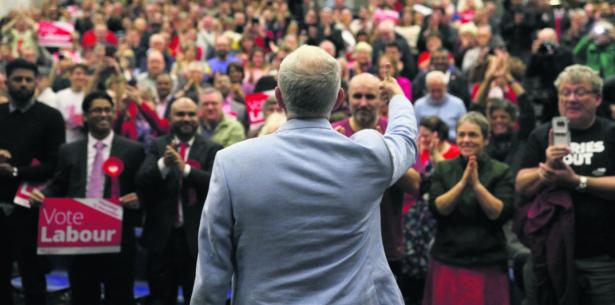Brexit Backlash Hits Labour Hard; What Next For Labour Movement? - Morning Star Editorial
If the Exit Poll is Right, This Election Will Transform British Politics - Martin Kettle (The Guardian)
Brexit Backlash Hits Labour Hard; What Next For Labour Movement? - Morning Star Editorial
Morning Star Editorial
December 12, 2019
Morning Star
A visibly shocked John McDonnell told the BBC that “Brexit has dominated” the election, as polls suggested a 86 seat majority for the Tories.
"We thought other issues could cut through and there would be a wider debate, from this evidence there clearly wasn't,” the shadow chancellor said.
If the actual result resembles the prediction, Labour will lose 52 seats, putting it on course for its worst result in terms of seats since 1935 following its decision to campaign for a second referendum on EU membership.
Many are in the north-east of England, constituencies which voted predominantly for Leave, such as historical mining constituency Blyth Valley.
Mr McDonnell added that he had doubts “Brexit will be done as a result of this.”
“I think what will happen... people, I think, almost in despair, wanted to get Brexit over and done with because they’ve had enough of what’s been going on."
Shadow justice secretary Richard Burgeon also suggested that Brexit dictated the vote.
He Tweeted: “If, as it seems, this was a Brexit election then the next one won’t be given Johnson’s Thatcherite agenda.”
But he vowed to continue the fight against the Tories.
His fighting spirit was shared by shadow education minister Angela Rayner who said: “I know the exit poll is incredibly devastating but we will continue to keep faith in our great movement and the UK.”
She also thanked the volunteers, staff and activists for “working their socks off” for a Labour government.
According to the exit poll politicians including Lib Dem leader Jo Swinson have lost their seats.
Mr McDonnell warned that the result would put “the most right-wing extreme cabinet that we’ve seen in our history” in power who would have the mandate to introduce “reactionary policies.”
"If the electorate have decided this way, that’s democracy, you have to respect it,” he said. “But I don’t think it will bring the country together, I think it will be divided still.”
After The Election, What Next for the Labour Movement?
Morning Star Editorial
December 12, 2019
Morning Star
When the dust settles on Britain’s first December election in a century the left and labour movement cannot afford a moment’s rest.
The Morning Star’s print deadlines mean voting is still ongoing as we head for the presses — but however the chips fall we are in for a tremendous struggle. In four-and-a-half years the state of the left has been transformed.
Two completely contrasting visions for our future were on the ballot paper. Labour’s offer went further than two years ago, it stood on a more detailed and more radical platform and has a programme that can not only make an immediate difference to the most vulnerable but presages a more permanent democratisation of our society.
In important respects that vision is already winning. The Conservatives cannot inspire activists as Labour does, and the existence of a mass Labour Party is itself a huge achievement. In contrast, as Labour revealed last month, one-third of Britain’s 151 billionaires have donated to the Tory Party.
Labour is also the only party presenting policies to the electorate, with other parties focused on spreading fear, building on four years of misrepresentation and smears against Jeremy Corbyn and knowing they can rely on a mass media which acts as a propaganda arm of the Establishment to amplify attacks on Labour, distort the party’s message and try to disorient and demoralise its supporters. Even by 2017’s standards the partisan Tory bias of the media has been breathtaking, leaving the BBC’s already strained claim to impartiality in tatters.
Win or lose, that’s been an education in the nature of class power for millions. Few will now fall for the idea that major newspapers and broadcasters are interested in the truth, rather than in perpetuating an unjust and unsustainable economic system.
And it’s not just the media. The role played at times by army officers (briefing in 2015 that a Corbyn election win could provoke “mutiny”), spooks (with their claims that Corbyn is a threat to national security), civil servants (claiming to the press that the Labour leader is too old and frail to be PM), foreign powers (such as US Secretary of State Mike Pompeo stating that the US was working to prevent a Corbyn victory) and by scores of MPs has brought shadowy forces out into the sunlight.
The British state has not been neutral as to whether Labour or the Conservatives should form a government. Millions have seen that. And the mantra that Corbyn represents an outdated ideology with no appeal to the electorate has been shattered. The parties of the status quo, which include the Lib Dems and SNP as well as the Tories, cannot fight Labour on policy.
That places us in a much stronger position than four years ago. But the strength of resistance isn’t neutralised by being recognised. The British ruling class is determined to stop a socialist transformation of our country. That reality faces us whether we are dealing with a Labour majority, a Tory majority or a hung parliament.
In the last two scenarios, enormous and immediate pressure will be put on Labour to remove Corbyn as its leader. In a hung parliament there will be forces saying a less controversial leader who would be acceptable to the likes of the Liberal Democrats would allow Labour to form a government — but as Kevin Ovenden has observed in this newspaper, such a government would be one restricted to a minor realignment of the status quo in the interests of certain sections of the capitalist class.
A Tory win will be seized on by pundits and the Labour right to announce once again that Corbyn is an electoral liability, despite Labour’s greatly improved performance since he took the helm. The grotesque bias of the media wouldn’t feature in narratives as to why Labour didn’t win. Nor are Labour Remainers likely to acknowledge any responsibility for a loss of support in Brexit-backing areas.
Defence of the left leadership would in those circumstances be just as essential as in a hung parliament. The left has made great advances in Labour, but could lose a lot of ground quickly, especially on peace and anti-imperialism where messages have been mixed even from Corbyn’s existing shadow cabinet.
A Labour majority would rightly be cause for celebration, but the battle would not be won. The Establishment will do all it can to frustrate delivery of the manifesto. Public ownership will be fought in the courts, as will efforts to kick private companies out of public services. Action on climate change will face determined opposition from the corporations growing fat off the ruin of our planet. And the fact that the Establishment has a substantial fifth column inside the parliamentary Labour party has been demonstrated repeatedly. Mass grassroots pressure will be key to delivering the Labour programme.
All scenarios require an intensification of left activity, bearing in mind that the electoral arena is only one part of the struggle. Labour’s mass canvassing operation has proved an impressive strength of the campaign, but it is clear, as Laura Smith put it a few days ago, that “the hunger for class politics in our working-class communities” is one that hasn’t been satisfied.
Labour needs to move from a mass party of activists to mass social movement, developing the kind of local presence that will effectively counter the economic and propaganda power of the elite because people in every town and city are connected to the movement itself. There have been moves towards this, through the People’s Assembly in some areas and through particularly effective trade union community campaigns such as those fought around school cuts.
Mobilising material help for the vulnerable (through shelters and foodbanks) and organising for defence or extension of community assets — from hospitals through libraries to bus routes — can be ways in which the labour movement makes a concerted effort to embed itself in the life of every working-class community in the land. The process of building a socialist alternative to our broken system will take time and patience.
The power of the ruling class is formidable, but it has lost control of British politics, and the appetite for an alternative is huge. Our biggest tasks lie ahead.
If the Exit Poll is Right, This Election Will Transform British Politics
By Martin Kettle
December 12, 2019
The Guardian

Photograph: Tolga Akmen/AFP via Getty Images // The Guardian
For the last last four UK general elections, bar 2015, the 10pm exit poll on election day has been almost exactly correct, even if sometimes the predictions have been a shock to many experts. So the likelihood is that the pollsters have got it right again in 2019. But whereas in 2017 their correct prediction of a hung parliament guaranteed a embattled legislature, the 2019 prediction may even transform British politics.
This election looks to be a triumph for the Conservatives under Boris Johnson. Their strategy of calling an early election and their campaign and messaging tactics during the last few weeks has been vindicated, with a predicted 368 seats in the new parliament, a majority of 86 over all other parties, and an incontrovertible mandate to take the UK out of the European Union in January.
If the exit poll is even broadly right, the message for the Tory party is of an historic recovery after the humiliations of the New Labour era. It transforms all recent analysis of the party’s place in UK politics, reuniting it with its reputation as the most resilient and successful election-winning party in Europe. The party has not won a comfortable working majority since 1987. A majority of 86 would mean Johnson can govern for a full five-year term, even though his promise to repeal the Fixed-Term Parliaments Act means he is likely not to take the country into another December election in 2024.
The victory is undeniably Johnson’s. A year ago he was on the backbenches. A majority of Tory MPs did not want him as their leader in the summer. Now he is the master of the British political scene, and will be able to pick his own cabinet, demand his MPs’ backing for his Brexit strategy (which may differ significantly from the one he has led his party to expect). He now has little reason to worry about Nigel Farage’s Brexit party either.

Photograph: Tolga Akmen/AFP via Getty Images // The Guardian
The question is whether this apparently emphatic victory is about “getting Brexit done” or whether it is a wider endorsement of Johnsonian Conservatism. The night’s detailed results will do much to supply the answer to this question. But if this is a Brexit victory, it may – possibly – prove in the end to be pyrrhic. If Johnson delivers Brexit and the Labour party reorganises, their position may prove a more fragile one than it seems immediately.
The second huge message of this election is that the Scottish National party has received a mandate – with a projected 55 seats in Scotland – to press for a second referendum on independence. Johnson has made clear he will not do what David Cameron did and concede a second indyref poll. His mandate is to defy the SNP. But the SNP has been prepared for this fight for months. The confrontation in Scotland will be at the very top of the political agenda now.
The final big message is Labour’s epochal collapse. Labour has lost four general elections in a row. Its projected 191 seats is its lowest in modern times. The Jeremy Corbyn project has taken what is surely a terminal beating. But the Liberal Democrats have not prospered at Labour’s expense. That achievement belongs to the Tories. Corbynites will doubtless blame everyone but themselves for this total disaster. But the question on the left of British politics is now the one that was embodied in the title of a book published after the last time Labour lost four elections in a row in 1992. The title was: Labour’s Last Chance? And one of the editors was John Curtice, whose exit poll this evening now poses that self-same question once again, nearly 30 years on.
[Martin Kettle is a Guardian columnist.]


Spread the word